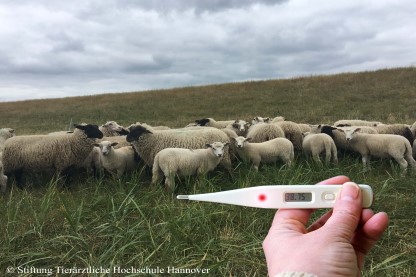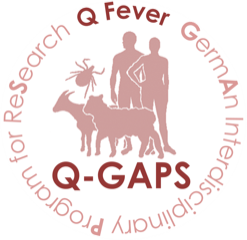Epidemiological studies on the prevalence of Q fever in flocks of small ruminants

[Photo: Stiftung Tierärztliche Hochschule Hannover]
Abstract
Human Q fever is caused by the bacterium Coxiella burnetii. In Germany, the disease is mostly spread to humans by infected sheep during lambing seasons. During this period, large numbers of C. burnetii can be shed with the placenta and fetal fluids. Even if humans don't have direct contact with animals, they can also be infected by inhaling contaminated droplets released by infected animals or inhaling barnyard dust particles contaminated by infected animals. Sheep are often without symptoms. In the case of goats and cattle, however, an infection can lead to abortion. People with acute Q fever can suffer from fever, headache and other unspecific symptoms. As the disease progresses, patients can develop pneumonia and in rare cases even endocarditis. Locally limited outbreaks have occurred again and again nationwide.
As part of the Q-GAPS zoonosis network, epidemiological studies on the prevalence of Q fever in flocks of small ruminants will be carried out by the partners of subproject 1. Vaginal and preputial swabs will be taken from sheep and goats and tested for pathogen specific gene sequences by means of PCR. The bacterium or part of the bacterium is identified by this molecular biological method providing information about the intensity of pathogen shedding. In parallel, blood samples of these animals will be tested for antibodies against C. burnetii. Further studies will deal with pathogen shedding in milk producing sheep and goat flocks (longitudinal study), the economic effects of a Coxiella infection especially in sheep flocks (cohort study) and the effects of vaccination on reproductive performance as well as pathogen shedding (intervention study) in C. burnetii positive flocks.
FINAL REPORT Q-GAPS 2017-2020 in German
Principal investigators

Prof. Dr. Martin Ganter
Stiftung Tierärztliche Hochschule Hannover
Klinik für Kleine Klauentiere
und Forensische Medizin und Ambulatorische Klinik
Bischofsholer Damm 15
30173 Hannover
Martin.ganter(at)tiho-hannover.de

Apl. Prof. Dr. Martin Runge
Lower State Office for
Consumer Protection and Food Safety
Food and Veterinary Institute
Braunschweig/Hannover,
Institute Braunschweig
Eintrachtweg 17
30173 Hannover
Martin.Runge(at)LAVES.Niedersachsen.de
Scientific Assistant
- Veterinary Specialist for small ruminants,
PGDipVCS (NZ)
Scientific Assistant -
Stiftung Tierärztliche Hochschule Hannover
Klinik für kleine Klauentiere
Bischofsholer Damm 15
30173 Hannover
Benjamin.Bauer(at)tiho-hannover.de
- Veterinarian -
Stiftung Tierärztliche Hochschule Hannover
Klinik für kleine Klauentiere
Bischofsholer Damm 15
30173 Hannover


